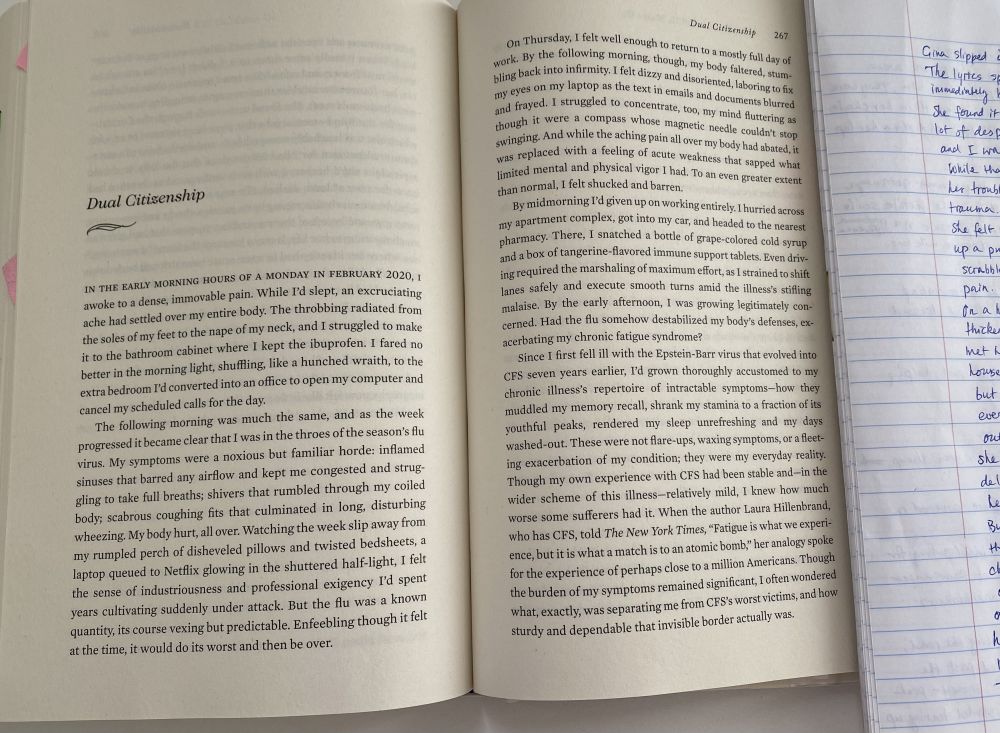十九世纪德国哲学家尼采曾经说过,“凡不能摧毁我的必将使我强大” (Out of life‘s school of war-- what doesn't kill me, makes me stronger”),乍一听很励志,可事实是不是如此呢?这句话的可信度到底如何呢?在人们经历了能改变人的一一生命运的重大不幸、苦难和打击之后,人还能劫后重生吗?是不是像尼采说的那样人会越挫越勇,变得更强大呢?
2022年出版的书名为What Doesn't Kill Us Makes Us就是通过对六位在年轻时(有些是teenages时)遭遇了重大人生不幸的人进行采访,通过真人真事来探讨这个话题。这六个人中有三位是因为车祸造成永久残疾,双腿高位截肢,脑部受损,脊椎重创脑部受伤而瘫痪。有两位是监狱犯,一位因失手杀人被重判无期徒刑,服刑二十年后被州长下文释放的,另一位是吸毒抢劫在监狱里待了7年多释放的;最后一位是遭人强奸,后又双眼彻底失明的。他们的遭遇让人唏嘘不已,(这里作者把监狱罪犯列入其中有他自己的理由),在当今崇尚强者(ableism)的社会,他们的生存是很艰难的。
如果你读了他们的故事之后,一句轻描淡写的总结“凡不能摧毁我的必将使我强大”,会给人一种站着说话不腰疼的感觉。他们遭受毁灭性的打击后,从绝望、痛苦挣扎、到接受面对,到劫后重生,其过程其实是非常艰辛,不是几句励志话语,几次心理疏导,几次康复治疗就能扭转的,因为他们要面对的是不可逆转的残疾,身体上的,心灵上的。他们的第一反应或许是,“为什么是我,为什么发生在我身上”,随后自然而然会期望生活能回到从前。可现实是残酷的,经过漫长的努力后,他们最后不得不无奈地选择接受现实,选择忘却。他们只有改变(transform)自我,寻求新的平衡点,才能更好地活下去。
谁不希望自己的人生一帆风顺?我们毕竟都是血肉之躯,并非铜墙铁壁的钢板一块。困境逆境本身是不会让人更坚强,它最多就是个强心剂,因为在没有选择的情况下,人只有强大了才能活下去。而这些貌似强大的人又是脆弱的(vulnerable),因为人的极限,因为留下的创伤,留下的阴影,失去健全身体造成种种局限,让他们的余生像是生活在一只风雨飘摇中的小船上,随时都可能被袭来的浪打翻。作者在书中写了这样一段比喻:他们就像生长在悬崖峭壁上的松树,土壤贫瘠,但是他们迎着阳光,顶着疾风顽强地生存,他们或许不会像大山中的松树那么宽大,但是他们的根须一样扎个得很深,他们一样活出了生命的深度。但是他们的人生又是脆弱的,某朝某日,如果岩石风化崩裂,他们的生命或许会就此戛然而止。
书写到最后一两章,作者把笔锋一转,提及尼采信仰的另一个哲理思想: amor fati, 翻译过来即:爱命运,无条件接受命运的安排。在人无法掌控的命运面前,顺服命运安排可能比尼采的战无不胜的人生哲理更现实。人大抵是抗争不过命的。这样的一本书结尾,是不是在一定程度上表达了作者对尼采“战无不胜”的理念的一种质疑呢?
愿我们都能好好活着,尽可能享受生命的宽度、长度和深度,享受健康,和健全身体带给我们的自由。让我们珍惜生命,远离疾病不幸和痛苦!
注:相比350页的一本书,我的读书笔记太短。作者Mike Mariani,是英文教授,新闻自由撰稿人。他对英语文字驾驭如此高超精湛,让赞叹不已,一边读一边做笔记(手抄了30多页,以后最好能在图书馆门口25美分的架子上买到一本,我已经很多年不给自己买新书了:),只是这样的文字读起来读到最后也会疲倦(最后懒得抄了),遂怀念起海明威的浅显易懂的文字:)。不过,这个世界永远会是雅俗共赏的世界。读这本书,与其说是在读他的内容思想,不如说是在读他的文字。

Quotes:
“In one of the notebooks he carried with him, Nietzsche wrote, "We have art lest we perish from the truth." For those leading afterlives, the unadorned facts of what's happened to them can be brutish to bear on their own terms. Contextualizing that hardship through our intellects and imaginations is a critical salve, an act of transforming our perception that can guide and color how we experience our lives. We can knead our experiences into a larger arc, providing the cohesion that helps us form new narrative identities. Or we can look deeper into our afterlives until we ferret out a way of construing them that rouses our spirits or points them toward salvation. In her essay collection The White Album, Joan Didion delivered a pronouncement that was a natural descendants to Nietzsche's line, an admission of how desperately we rely on the subjective fictions we construct: "We tell ourselves stories in order to live." Those stories--whether they take the form of redemption narratives, personal parables, or the pearlescent beliefs we kneel before each day like shrines offering eternal grace--can elevate our lives and serve as the vessels of private deliverance.”
“Examining our behaviors and thought patterns demands sustained, uninterrupted self-work, and the fullness of our everyday lives and the finite attention spans that rove through them sometimes appear engineered to thwart personal investigations. For many, such an undertaking is undesirable in any case: Those of us content with our lives are not compelled to confront or interrogate our habits, lifestyles, or underlying beliefs. Contentment doesn't incentivize change--it does everything in its power to forestall it. But those of us learning to survive in the ill-disposed, unaccommodating terrain of afterlives--marooned on the desert islands we have little affinity for--must open ourselves up to it.”
“The Lebanese American poet Kahlil Gibran wrote, "The deeper that sorrow carves into your being, the more joy you can contain." The catastrophes that carve themselves deep inside of us also leave us with increased depth, augmenting the volume of feeling we're able to hold. And how can we measure devotion but by how much the vessels that we become for our art, faith, saviors, and crusades have the capacity to contain?”
“In Far from the Tree, Andrew Solomon writes, "It takes an act of will to grow from loss: the disruption provides the opportunity for growth, not the growth itself." Catastrophes do not trigger transformation; they only establish the conditions that increase the likelihood that we will pursue them. Only through our willful, persevering actions can we gradually remake our identities.”
|